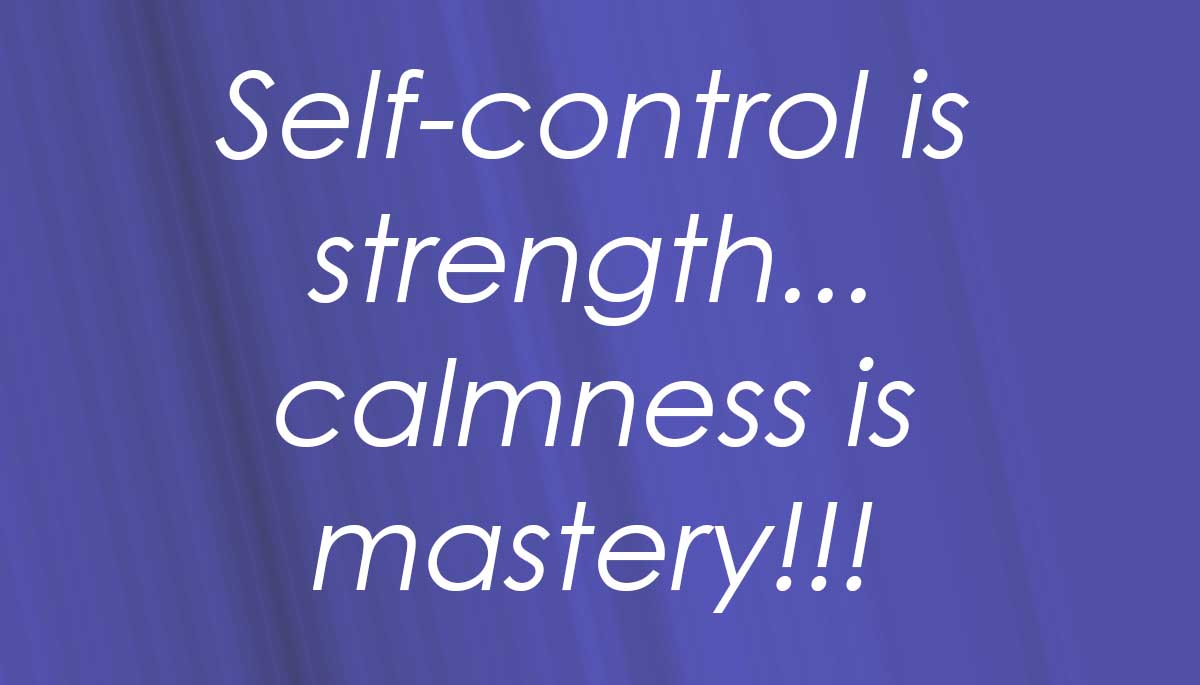Self control is strength. Calmness is mastery is the famous quote that shared by Areva Martin a long time ago on the Facebook. The real person name who said self-control is strength calmness is mastery is still unknown but this quote has a deep meaning which tells a lot about life!
Finding strength and sustaining a sense of power over our emotions and actions can be difficult in the fast-paced and chaotic environment we live in.
However, we can only reach a level of inner peace and realize our actual potential when we actively pursue self-control and tranquillity. According to the proverb, “self-control is strength, and calmness is mastery.” These two values are not only linked, but also necessary for well-being, success, and personal development.
How self-control is strength
The capacity to control our ideas, emotions, and behaviors is known as self-control. It is the capacity to withstand temptations, put off gratification, and maintain attention on long-term objectives in spite of immediate distractions. Self-control demands self-discipline, mindfulness, and an in-depth knowledge of oneself. Instead of trying to control our emotions or resist our wants, we should learn to do so.
Self-control teaches us managing
Controlling our impulses is one of the most important components of self-control. In today’s environment, immediate gratification alternatives are all around us. Exercising self-control enables us to make deliberate decisions rather than giving in to fleeting cravings, whether it’s the want to indulge in bad food, spend money hastily, or respond impulsively to a provocation. We can put our long-term wellbeing ahead of our short-term pleasure by exercising self-control.
Self-control helps to achieve goals
Self-control is also necessary for accomplishing both personal and professional objectives. In the face of obstacles and setbacks, it enables us to maintain our dedication and tenacity. High self-control individuals are more likely to set practical goals, develop successful tactics to reach those goals, and persist until success is achieved. They appreciate the importance of postponed gratification and are prepared to exert the required work and make the necessary sacrifices to achieve their goals.
Self-control in relationship
Furthermore, emotional intelligence and self-control go hand in hand. It permits us to control our emotions, preventing irrational outbursts and preserving wholesome connections. When we have control of our emotions, we can react to the situations and people around us wisely and empathetically rather than reflexively. Being able to maintain our composure under pressure enables us to resolve issues and speak clearly, which promotes happy relationships.
How Calmness is Mastery
Contrarily, calmness is the state of serenity and peace that results from a trained mind and a restrained disposition. It is the capacity to preserve inner tranquility in spite of external situations. Being calm is the ability to maintain your composure and focus in the face of life’s storms, not the absence of emotions or difficulties.
It is more crucial than ever to practice tranquility in a world where distractions abound. We can think clearly and make logical conclusions when we have the ability to maintain our composure under stress. It promotes mental and emotional health by preventing us from becoming overtaken by stress and anxiety. We may handle challenging problems with clarity, inventiveness, and resilience when we are calm.
Calmness is contagious
Being calm ourselves has a great impact on people around us. Our presence has a calming impact, defusing difficult situations and encouraging others to discover their own inner tranquility. We foster an atmosphere that is productive, collaborative, and conducive to deep relationships by maintaining our composure.
Calmness enhances our ability
Additionally, being calm makes it easier for us to listen and comprehend. When we are peaceful, we are completely in the present and aware of the wants and viewpoints of others. Our relationships are strengthened and empathy is fostered by this attentive listening. By remaining composed, we may establish secure environments for frank discussion and useful problem-solving.
Recognizing that self-control and composure are skills that can be developed and improved through time is crucial in the pursuit of these qualities. They demand patience and practice, just like any other skill. Here are some techniques for exercising restraint and cultivating composure:
- Mindfulness: Practice being fully present in the moment, observing your thoughts, emotions, and sensations without judgment. This awareness allows you to choose your responses consciously, rather than reacting impulsively.
- Set clear goals: Define your long-term goals and break them down into smaller, achievable steps. Having a clear vision and plan helps you stay focused and motivated, even when faced with distractions or obstacles.
- Develop healthy habits: Establish routines and rituals that support your well-being and contribute to your overall self-control. This could include regular exercise, a balanced diet, quality sleep, and moments of relaxation or meditation.
- Embrace discomfort: Learn to tolerate discomfort and delay gratification. Recognize that short-term discomfort can lead to long-term rewards. Practice saying no to immediate impulses that don’t align with your goals or values.
- Practice self-compassion: Be kind and understanding towards yourself when you experience setbacks or make mistakes. Self-compassion allows you to learn from failures and move forward with resilience.
- Engage in stress-reducing activities: Find activities that help you relax and recharge, such as spending time in nature, practicing yoga or mindfulness meditation, or engaging in creative pursuits.
Final Words
In both our personal and professional life, self-control and composure are vital qualities.
They provide us the strength, poise, and purpose we need to deal with life’s challenges. We obtain the strength to overcome obstacles and accomplish our goals through learning self-control. We may control our emotions and improve our well-being by practicing tranquility.
They work well together to give us the ability to live satisfying lives and have a beneficial influence on the world.

